Results
-
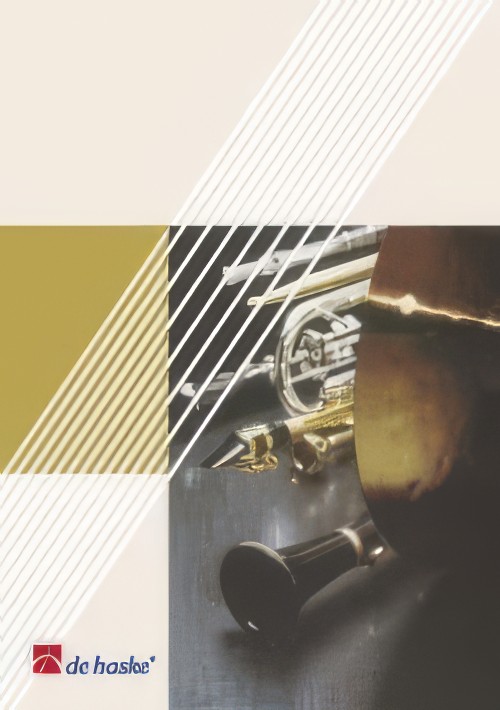 £104.99
£104.99Stayin' Alive (Concert Band - Score and Parts) - Iwai, Naohiro
The hit of the seventies! When you say disco, you immediately think of the Bee Gees. Their hit song Stayin' Alive has become an evergreen partly due to the fabulous dancing of John Travolta in the film Saturday Night Fever. This arrangement for concert band will make a great encore at your next concert!Duration: 4:30
Estimated dispatch 7-14 working days
-
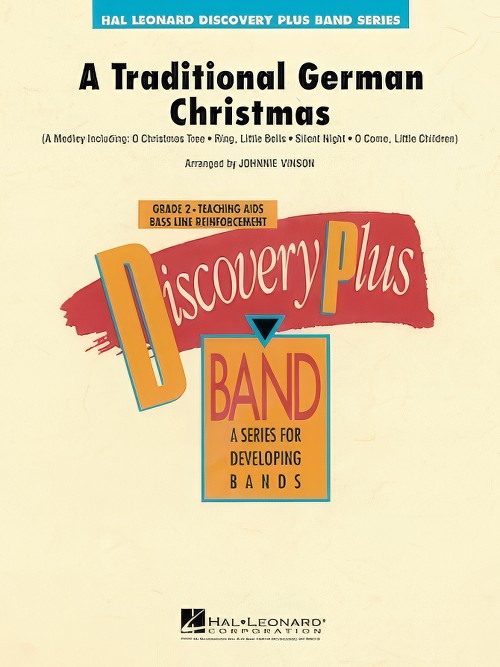 £57.50
£57.50A Traditional German Christmas (Concert Band - Score and Parts) - Vinson, Johnnie
Drawing on the rich heritage of German carols, Johnnie has created a real holiday treat for young bands. Includes O Come, Little Children; Ring, Little Bells; O Christmas Tree and Silent Night.
Estimated dispatch 7-14 working days
-
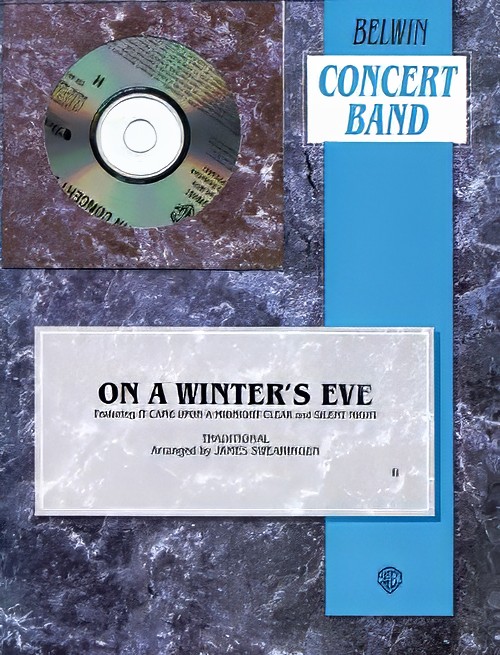 £53.95
£53.95On a Winter's Eve (Concert Band - Score and Parts) - Swearingen, James
A wonderfully lush holiday combination of "It Came Upon a Midnight Clear" and "Silent Night" is characterized with thick harmonies and flowing melodic material. This chart is a nice contrast in your holiday program. Legitimate music for the holiday season. Inspiring! Duration: 3.15
Estimated dispatch 7-14 working days
-
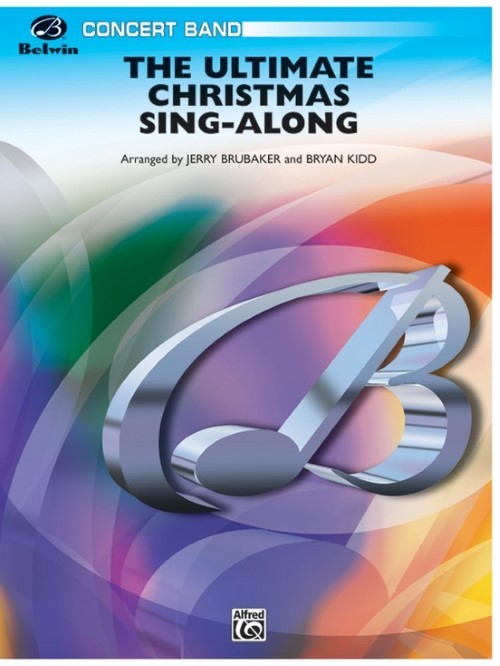 £70.50
£70.50The Ultimate Christmas Sing-Along (Concert Band - Score and Parts) - Brubaker & Kidd
Just as the title implies, absolutely all of your holiday needs are met in this one assortment of Christmas favourites. Included in the medley are "Jingle Bells," "Deck the Halls," "Silent Night," and "We Wish You a Merry Christmas." Designed as a sing-along with audience-participation, this work is certain to bring the holiday spirit to your entire community. Duration: 3.00
Estimated dispatch 7-14 working days
-
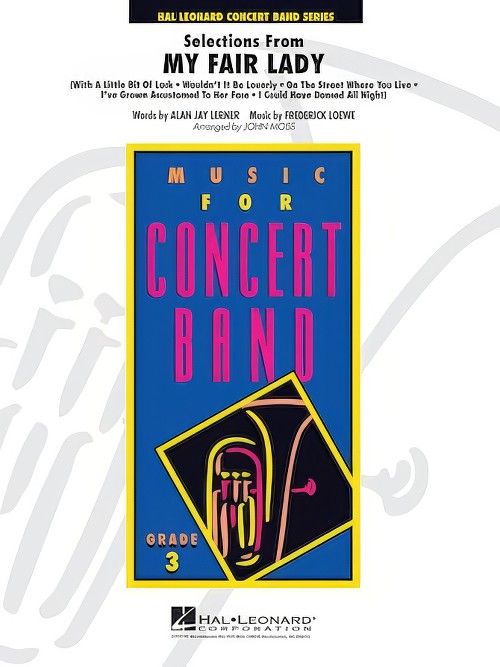 £72.99
£72.99My Fair Lady, Selections from (Concert Band - Score and Parts) - Lerner & Loewe - Moss, John
John Moss brings us a superb new arrangement of one of the most popular musicals ever written. Many of the songs from this magnificant show have gone on to become standards on their own. Includes Get Me to the Church on Time, I Could Have Danced All Night, I've Grown Accustomed to Her Face, On the Street Where You Live, With a Little Bit of Luck, and Wouldn't It Be Loverly.
Estimated dispatch 7-14 working days
-
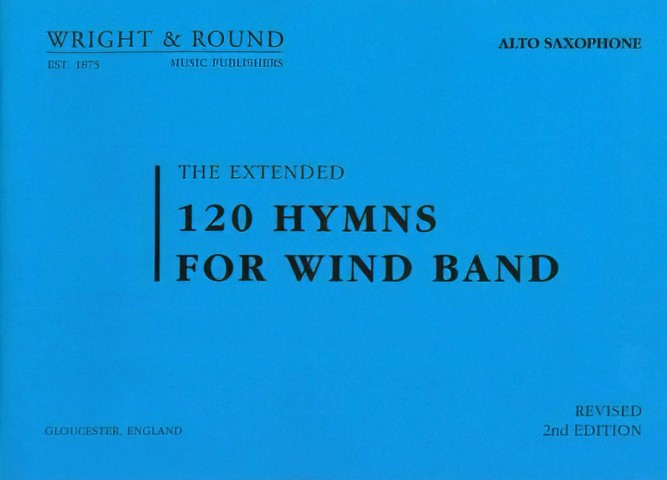 £7.50
£7.50120 Hymns for Wind Band (1st Clarinet) - Steadman-Allen, Ray
Contents 1. Aberystwyth31. Geibel 61. National Anthem 91. St. Michael121. Angels from the Realms of Glory2. Abridge32. Gerontius62. Nearer, My God, To Thee92. St. Oswald122. As with Gladness3. Angelus33. Gopsal63. Nicaea93. St. Peter123. Christians Awake4. Aurelia34. Hanover64. Notingham (Mozart)94. St. Theodulph124. The Coventry Carol;5. Austrian Hymn35. Hollingside65. Nun Danket95. St. Theresa125. Ding Dong Merrily on High6. Belmont36. Horsley66. Old Hundredth96. Samuel126. Deck the Halls7. Blaenwern37. Hursley67. Passion Chorale97. Sandon127. God Rest ye Merry Gentlemen8. Carlisle38. Hyfrydol68. Penlan98. Sawston128. Good King Wenceslas9. Christ the King39. Innocents69. Pentecost99. Sine Nomine129. Good Christian Men Rejoice10. Colne40. Kocher70. Pilgrims100. Stella130. The Holly and The Ivy11. Cor Jesu41. Laudate Dominum71. Praise my Soul101. Stracathro131. I Saw Three Ships12. Corpus Christi42. Laudes Domini72. Redhead102. Stuttgart132. It Came upon the Midnight Clear13. Crimond43. Lloyd73. Regent Square103. Tallis' Canon133. Jingle Bells14. Cross of Jesus44. Lobe den Herren74. Richmond104. Turris Davidica134. O Little Town of Bethlehem15. Darwalls 148th45. Love Divine75. Rimmington105. Victory135. The Rocking Carol16. Day of Rest46. Lux Benigna76. Rockingham106. Vox Dilecti136. See Amid the Winter Snow17. Dennis47. Maidstone77. St. Agnes107. Wareham137. Unto us a Child is Born18. Diadem48. Mannheim78. St. Albinus108. Warrington138. Wassail19. Diademata49. Martyrdom79. St. Ann109. Westminster139. We Three Kings20. Divine Mysteries50. Maryton80. St. Bees110. When He Cometh140. We Wish you a Merry Christmas21. Dix51. Melcombe81. St. Cecilia111. Whitburn 22. Dominus Regit Me52. Melita82. St. Clement112. Wiltshire 23. Duke Street53. Miles Lane83. St. Columba113. Wir pflugen (Dresden) 24.Dundee (French)54. Misericordia84. St. Cuthbert114. O Come All Ye Faithful 25. Easter Hymn55. Missionary85. St. Denio115. Away in a Manger 26. Ein' Feste Burg56. Monkland86. St. Ethelwald116. Hark! The Herald Angels Sing 27. Ellacombe57. Monks Gate87. St. Francis117. Once in Royal David's City 28. Ellers58. Morning Hymn88. St. George118. Nowell 29. Eventide59. Morning Light89. St. Gertrude119. Silent Night 30. Franconia60. Moscow90. St. Magnus120. While Shepherds Watched
Estimated dispatch 7-14 working days
-
 £7.50
£7.50120 Hymns for Wind Band (1st F Horn) - Steadman-Allen, Ray
Contents 1. Aberystwyth31. Geibel 61. National Anthem 91. St. Michael121. Angels from the Realms of Glory2. Abridge32. Gerontius62. Nearer, My God, To Thee92. St. Oswald122. As with Gladness3. Angelus33. Gopsal63. Nicaea93. St. Peter123. Christians Awake4. Aurelia34. Hanover64. Notingham (Mozart)94. St. Theodulph124. The Coventry Carol;5. Austrian Hymn35. Hollingside65. Nun Danket95. St. Theresa125. Ding Dong Merrily on High6. Belmont36. Horsley66. Old Hundredth96. Samuel126. Deck the Halls7. Blaenwern37. Hursley67. Passion Chorale97. Sandon127. God Rest ye Merry Gentlemen8. Carlisle38. Hyfrydol68. Penlan98. Sawston128. Good King Wenceslas9. Christ the King39. Innocents69. Pentecost99. Sine Nomine129. Good Christian Men Rejoice10. Colne40. Kocher70. Pilgrims100. Stella130. The Holly and The Ivy11. Cor Jesu41. Laudate Dominum71. Praise my Soul101. Stracathro131. I Saw Three Ships12. Corpus Christi42. Laudes Domini72. Redhead102. Stuttgart132. It Came upon the Midnight Clear13. Crimond43. Lloyd73. Regent Square103. Tallis' Canon133. Jingle Bells14. Cross of Jesus44. Lobe den Herren74. Richmond104. Turris Davidica134. O Little Town of Bethlehem15. Darwalls 148th45. Love Divine75. Rimmington105. Victory135. The Rocking Carol16. Day of Rest46. Lux Benigna76. Rockingham106. Vox Dilecti136. See Amid the Winter Snow17. Dennis47. Maidstone77. St. Agnes107. Wareham137. Unto us a Child is Born18. Diadem48. Mannheim78. St. Albinus108. Warrington138. Wassail19. Diademata49. Martyrdom79. St. Ann109. Westminster139. We Three Kings20. Divine Mysteries50. Maryton80. St. Bees110. When He Cometh140. We Wish you a Merry Christmas21. Dix51. Melcombe81. St. Cecilia111. Whitburn 22. Dominus Regit Me52. Melita82. St. Clement112. Wiltshire 23. Duke Street53. Miles Lane83. St. Columba113. Wir pflugen (Dresden) 24.Dundee (French)54. Misericordia84. St. Cuthbert114. O Come All Ye Faithful 25. Easter Hymn55. Missionary85. St. Denio115. Away in a Manger 26. Ein' Feste Burg56. Monkland86. St. Ethelwald116. Hark! The Herald Angels Sing 27. Ellacombe57. Monks Gate87. St. Francis117. Once in Royal David's City 28. Ellers58. Morning Hymn88. St. George118. Nowell 29. Eventide59. Morning Light89. St. Gertrude119. Silent Night 30. Franconia60. Moscow90. St. Magnus120. While Shepherds Watched
Estimated dispatch 7-14 working days
-
 £7.50
£7.50120 Hymns for Wind Band (1st Trombone BC) - Steadman-Allen, Ray
Contents 1. Aberystwyth31. Geibel 61. National Anthem 91. St. Michael121. Angels from the Realms of Glory2. Abridge32. Gerontius62. Nearer, My God, To Thee92. St. Oswald122. As with Gladness3. Angelus33. Gopsal63. Nicaea93. St. Peter123. Christians Awake4. Aurelia34. Hanover64. Notingham (Mozart)94. St. Theodulph124. The Coventry Carol;5. Austrian Hymn35. Hollingside65. Nun Danket95. St. Theresa125. Ding Dong Merrily on High6. Belmont36. Horsley66. Old Hundredth96. Samuel126. Deck the Halls7. Blaenwern37. Hursley67. Passion Chorale97. Sandon127. God Rest ye Merry Gentlemen8. Carlisle38. Hyfrydol68. Penlan98. Sawston128. Good King Wenceslas9. Christ the King39. Innocents69. Pentecost99. Sine Nomine129. Good Christian Men Rejoice10. Colne40. Kocher70. Pilgrims100. Stella130. The Holly and The Ivy11. Cor Jesu41. Laudate Dominum71. Praise my Soul101. Stracathro131. I Saw Three Ships12. Corpus Christi42. Laudes Domini72. Redhead102. Stuttgart132. It Came upon the Midnight Clear13. Crimond43. Lloyd73. Regent Square103. Tallis' Canon133. Jingle Bells14. Cross of Jesus44. Lobe den Herren74. Richmond104. Turris Davidica134. O Little Town of Bethlehem15. Darwalls 148th45. Love Divine75. Rimmington105. Victory135. The Rocking Carol16. Day of Rest46. Lux Benigna76. Rockingham106. Vox Dilecti136. See Amid the Winter Snow17. Dennis47. Maidstone77. St. Agnes107. Wareham137. Unto us a Child is Born18. Diadem48. Mannheim78. St. Albinus108. Warrington138. Wassail19. Diademata49. Martyrdom79. St. Ann109. Westminster139. We Three Kings20. Divine Mysteries50. Maryton80. St. Bees110. When He Cometh140. We Wish you a Merry Christmas21. Dix51. Melcombe81. St. Cecilia111. Whitburn 22. Dominus Regit Me52. Melita82. St. Clement112. Wiltshire 23. Duke Street53. Miles Lane83. St. Columba113. Wir pflugen (Dresden) 24.Dundee (French)54. Misericordia84. St. Cuthbert114. O Come All Ye Faithful 25. Easter Hymn55. Missionary85. St. Denio115. Away in a Manger 26. Ein' Feste Burg56. Monkland86. St. Ethelwald116. Hark! The Herald Angels Sing 27. Ellacombe57. Monks Gate87. St. Francis117. Once in Royal David's City 28. Ellers58. Morning Hymn88. St. George118. Nowell 29. Eventide59. Morning Light89. St. Gertrude119. Silent Night 30. Franconia60. Moscow90. St. Magnus120. While Shepherds Watched
Estimated dispatch 7-14 working days
-
 £7.50
£7.50120 Hymns for Wind Band (1st Trumpet) - Steadman-Allen, Ray
Contents 1. Aberystwyth31. Geibel 61. National Anthem 91. St. Michael121. Angels from the Realms of Glory2. Abridge32. Gerontius62. Nearer, My God, To Thee92. St. Oswald122. As with Gladness3. Angelus33. Gopsal63. Nicaea93. St. Peter123. Christians Awake4. Aurelia34. Hanover64. Notingham (Mozart)94. St. Theodulph124. The Coventry Carol;5. Austrian Hymn35. Hollingside65. Nun Danket95. St. Theresa125. Ding Dong Merrily on High6. Belmont36. Horsley66. Old Hundredth96. Samuel126. Deck the Halls7. Blaenwern37. Hursley67. Passion Chorale97. Sandon127. God Rest ye Merry Gentlemen8. Carlisle38. Hyfrydol68. Penlan98. Sawston128. Good King Wenceslas9. Christ the King39. Innocents69. Pentecost99. Sine Nomine129. Good Christian Men Rejoice10. Colne40. Kocher70. Pilgrims100. Stella130. The Holly and The Ivy11. Cor Jesu41. Laudate Dominum71. Praise my Soul101. Stracathro131. I Saw Three Ships12. Corpus Christi42. Laudes Domini72. Redhead102. Stuttgart132. It Came upon the Midnight Clear13. Crimond43. Lloyd73. Regent Square103. Tallis' Canon133. Jingle Bells14. Cross of Jesus44. Lobe den Herren74. Richmond104. Turris Davidica134. O Little Town of Bethlehem15. Darwalls 148th45. Love Divine75. Rimmington105. Victory135. The Rocking Carol16. Day of Rest46. Lux Benigna76. Rockingham106. Vox Dilecti136. See Amid the Winter Snow17. Dennis47. Maidstone77. St. Agnes107. Wareham137. Unto us a Child is Born18. Diadem48. Mannheim78. St. Albinus108. Warrington138. Wassail19. Diademata49. Martyrdom79. St. Ann109. Westminster139. We Three Kings20. Divine Mysteries50. Maryton80. St. Bees110. When He Cometh140. We Wish you a Merry Christmas21. Dix51. Melcombe81. St. Cecilia111. Whitburn 22. Dominus Regit Me52. Melita82. St. Clement112. Wiltshire 23. Duke Street53. Miles Lane83. St. Columba113. Wir pflugen (Dresden) 24.Dundee (French)54. Misericordia84. St. Cuthbert114. O Come All Ye Faithful 25. Easter Hymn55. Missionary85. St. Denio115. Away in a Manger 26. Ein' Feste Burg56. Monkland86. St. Ethelwald116. Hark! The Herald Angels Sing 27. Ellacombe57. Monks Gate87. St. Francis117. Once in Royal David's City 28. Ellers58. Morning Hymn88. St. George118. Nowell 29. Eventide59. Morning Light89. St. Gertrude119. Silent Night 30. Franconia60. Moscow90. St. Magnus120. While Shepherds Watched
Estimated dispatch 7-14 working days
-
 £7.50
£7.50120 Hymns for Wind Band (2nd F Horn) - Steadman-Allen, Ray
Contents 1. Aberystwyth31. Geibel 61. National Anthem 91. St. Michael121. Angels from the Realms of Glory2. Abridge32. Gerontius62. Nearer, My God, To Thee92. St. Oswald122. As with Gladness3. Angelus33. Gopsal63. Nicaea93. St. Peter123. Christians Awake4. Aurelia34. Hanover64. Notingham (Mozart)94. St. Theodulph124. The Coventry Carol;5. Austrian Hymn35. Hollingside65. Nun Danket95. St. Theresa125. Ding Dong Merrily on High6. Belmont36. Horsley66. Old Hundredth96. Samuel126. Deck the Halls7. Blaenwern37. Hursley67. Passion Chorale97. Sandon127. God Rest ye Merry Gentlemen8. Carlisle38. Hyfrydol68. Penlan98. Sawston128. Good King Wenceslas9. Christ the King39. Innocents69. Pentecost99. Sine Nomine129. Good Christian Men Rejoice10. Colne40. Kocher70. Pilgrims100. Stella130. The Holly and The Ivy11. Cor Jesu41. Laudate Dominum71. Praise my Soul101. Stracathro131. I Saw Three Ships12. Corpus Christi42. Laudes Domini72. Redhead102. Stuttgart132. It Came upon the Midnight Clear13. Crimond43. Lloyd73. Regent Square103. Tallis' Canon133. Jingle Bells14. Cross of Jesus44. Lobe den Herren74. Richmond104. Turris Davidica134. O Little Town of Bethlehem15. Darwalls 148th45. Love Divine75. Rimmington105. Victory135. The Rocking Carol16. Day of Rest46. Lux Benigna76. Rockingham106. Vox Dilecti136. See Amid the Winter Snow17. Dennis47. Maidstone77. St. Agnes107. Wareham137. Unto us a Child is Born18. Diadem48. Mannheim78. St. Albinus108. Warrington138. Wassail19. Diademata49. Martyrdom79. St. Ann109. Westminster139. We Three Kings20. Divine Mysteries50. Maryton80. St. Bees110. When He Cometh140. We Wish you a Merry Christmas21. Dix51. Melcombe81. St. Cecilia111. Whitburn 22. Dominus Regit Me52. Melita82. St. Clement112. Wiltshire 23. Duke Street53. Miles Lane83. St. Columba113. Wir pflugen (Dresden) 24.Dundee (French)54. Misericordia84. St. Cuthbert114. O Come All Ye Faithful 25. Easter Hymn55. Missionary85. St. Denio115. Away in a Manger 26. Ein' Feste Burg56. Monkland86. St. Ethelwald116. Hark! The Herald Angels Sing 27. Ellacombe57. Monks Gate87. St. Francis117. Once in Royal David's City 28. Ellers58. Morning Hymn88. St. George118. Nowell 29. Eventide59. Morning Light89. St. Gertrude119. Silent Night 30. Franconia60. Moscow90. St. Magnus120. While Shepherds Watched
Estimated dispatch 7-14 working days
